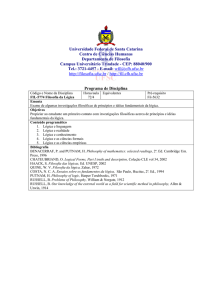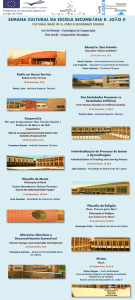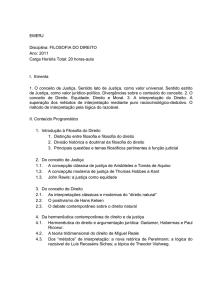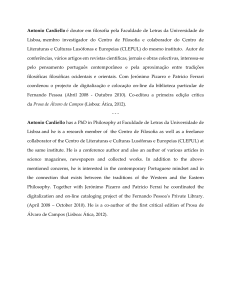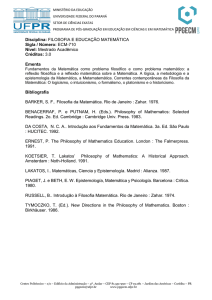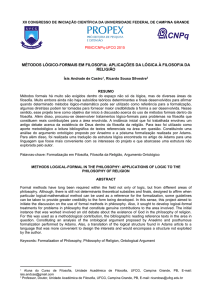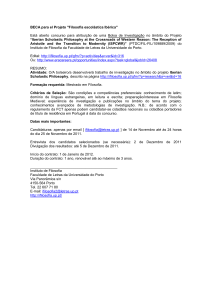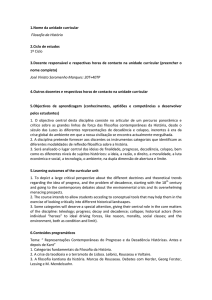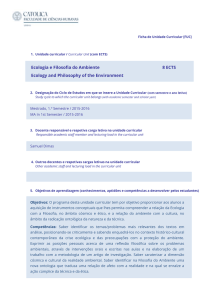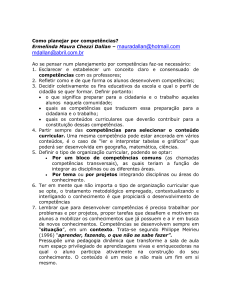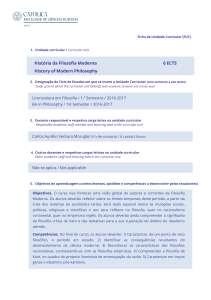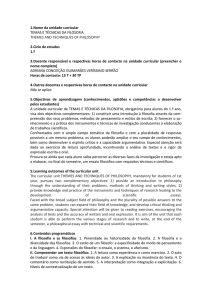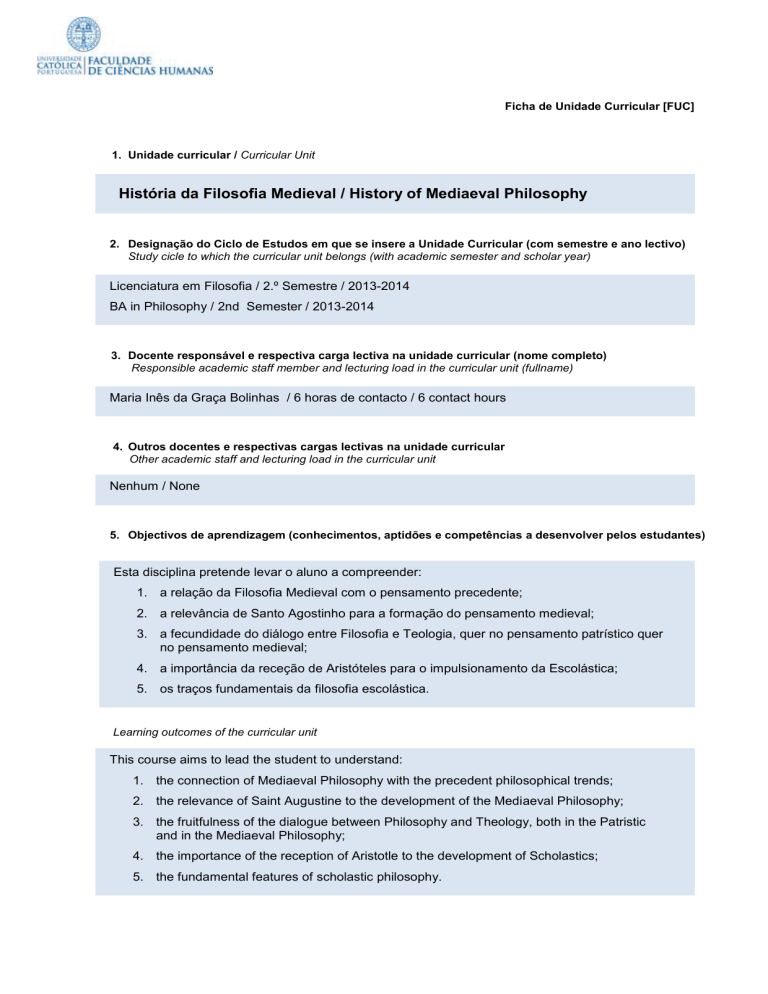
Ficha de Unidade Curricular [FUC]
1. Unidade curricular / Curricular Unit
História da Filosofia Medieval / History of Mediaeval Philosophy
2. Designação do Ciclo de Estudos em que se insere a Unidade Curricular (com semestre e ano lectivo)
Study cicle to which the curricular unit belongs (with academic semester and scholar year)
Licenciatura em Filosofia / 2.º Semestre / 2013-2014
BA in Philosophy / 2nd Semester / 2013-2014
3. Docente responsável e respectiva carga lectiva na unidade curricular (nome completo)
Responsible academic staff member and lecturing load in the curricular unit (fullname)
Maria Inês da Graça Bolinhas / 6 horas de contacto / 6 contact hours
4. Outros docentes e respectivas cargas lectivas na unidade curricular
Other academic staff and lecturing load in the curricular unit
Nenhum / None
5. Objectivos de aprendizagem (conhecimentos, aptidões e competências a desenvolver pelos estudantes)
Esta disciplina pretende levar o aluno a compreender:
1. a relação da Filosofia Medieval com o pensamento precedente;
2. a relevância de Santo Agostinho para a formação do pensamento medieval;
3. a fecundidade do diálogo entre Filosofia e Teologia, quer no pensamento patrístico quer
no pensamento medieval;
4. a importância da receção de Aristóteles para o impulsionamento da Escolástica;
5. os traços fundamentais da filosofia escolástica.
Learning outcomes of the curricular unit
This course aims to lead the student to understand:
1. the connection of Mediaeval Philosophy with the precedent philosophical trends;
2. the relevance of Saint Augustine to the development of the Mediaeval Philosophy;
3. the fruitfulness of the dialogue between Philosophy and Theology, both in the Patristic
and in the Mediaeval Philosophy;
4. the importance of the reception of Aristotle to the development of Scholastics;
5. the fundamental features of scholastic philosophy.
6. Conteúdos programáticos
1. Introdução.
A Filosofia Medieval: definição e caracterização.
2. Filosofia Tardo-Imperial
Exigência de pensar a fé no debate com as escolas do Helenismo Tardio. Função
pedagógica da filosofia em ordem à fé (Justino, São Gregório de Nissa, Santo Agostinho).
3. Santo Agostinho
Momentos decisivos do itinerário agostiniano, em diálogo com o Maniqueísmo e a filosofia.
Reformulação do amor à sabedoria pela exigência de Absoluto.
4. Translatio studiorum
Relevância dada à transmissão e manutenção dos saberes no quadro das artes liberais,
entre os séculos V e X (Boécio, Pseudo-Dionísio, Escoto Eriúgena).
5. Renovação dos Saberes
Anselmo de Cantuária e o otimismo da fides quaerens intellectum, no contexto da
discussão dialética. Emergência da razão e escolástica sentenciária.
6. Apogeu da Escolástica no séc. XIII
A receção de Aristóteles e suas consequências no contexto da formação das
Universidades. A síntese de São Tomás de Aquino.
Syllabus
1. Introduction
Mediaeval Philosophy: its definition and characterization.
2. Late-imperial Philosophy
The requirement of thinking faith within the debate with the schools of the Hellenistic Age.
The pedagogical function of philosophy in relation to faith (Justin, St. Gregory of Nyssa, St.
Augustine).
3. St. Augustine
The decisive moments of the Augustinian itinerary, in dialogue with the Manichaeism and
Philosophy. The recasting of the love of wisdom by the requirement of the Absolute.
4. Translatio studiorum
The relevance of the maintenance and transmission of knowledge within the frame of liberal
arts, in V - X centuries (Boethius, Dionysius, Scottus Eriugena).
5. The Renewal of Knowledge
St. Anselm and the optimism of the fides quaerens intellectum. The emergence of reason
and the Early Scholasticism.
6. High Scholasticism
The reception of Aristotle and its consequences in the context of the formation of the
universities. The synthesis of St. Thomas.
7. Metodologia de ensino (avaliação incluída)
Ensino: A disciplina será lecionada em regime blended-learning. Assim, as sessões presenciais
(teóricas e teórico-práticas) serão complementadas por diferentes atividades realizadas através
da plataforma moodle.
Avaliação: A avaliação é contínua. A admissão a Exame Final encontra-se condicionada pelo
Regulamento da Faculdade de Ciências Humanas. A classificação final será atribuída após
ponderação dos seguintes elementos:
Teste escrito presencial, no final do semestre – 50%;
Atividades realizadas através da plataforma moodle – 50% (dois trabalhos: 25% + 25%).
Teaching methodologies (including evaluation)
Teaching methodologies: The course will be taught in blended-learning regime. Classroom
sessions (theoretical and practical) will be complemented by various activities performed in the
moodle platform.
Evaluation: The evaluation consists in a process of continuous assessment. The admission to
Final Examination is conditioned to the rules of the Faculty of Human Sciences. The final mark
will be assigned after the consideration of the following elements, weighted as indicated bellow:
Classroom test, at the end of the semester – 50%;
Activities performed in the moodle platform – 50% (two works: 25% + 25%).
8. Bibliografia principal
Main bibliography
TEXTOS
SANTO AGOSTINHO, As Confissões, Lisboa, IN-CM, 2000.
SANTO AGOSTINHO, Diálogo sobre a Felicidade, Lisboa, Edições 70, 1997.
SÃO TOMÁS DE AQUINO, Suma contra los gentiles, 2 Vols., Madrid, B. A. C., 1967-1968.
SÃO TOMÁS DE AQUINO, Suma Teológica, Vols. 1 e 2, São Paulo, Loyola, 2001-2002.
ESTUDOS
ARMSTRONG, A. H., e MARKUS, R. A., Fé cristã e filosofia grega, Lisboa, União Gráfica,
1970.
BOEHNER, PH., e GILSON, E., História da Filosofia Cristã, Petrópolis, Vozes, 1991.
COSTA FREITAS, M. B., O Ser e os Seres. Itinerários Filosóficos, Vol. 1, Lisboa, Verbo,
2004.
FRAILLE, G., Historia de la Filosofia, Vol. 11, Madrid, B. A. C., 1966.
ROSA, J. M. S., Em busca do Centro. Investigações sobre a noção de Ordem na obra de
Santo Agostinho (Período de Cassicíaco), Lisboa, U. C. E., 1999.
VIGNAUX, P., A Filosofia na Idade Média, Lisboa, Presença, 1994.
XAVIER, Maria Leonor L. O., Questões de Filosofia na Idade Média, Lisboa, Colibri, 2007.

